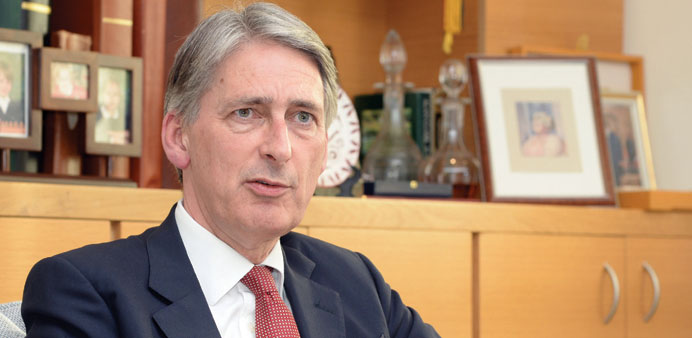|
UK and Qatar have agreed that a military intervention in Iraq would not resolve the crisis unless there was a political solution first, UK’s secretary of state for defence said yesterday. |
Secretary of state for defence Philip Hammond made the remarks at a press roundtable held at the British embassy yesterday. He met the media after his meeting with HE the Foreign Minister Dr Khalid bin Mohamed al-Attiyah during his one day visit to Doha. He later also met with HE Defence Minister Maj-Gen Hamad bin Ali al-Attiyah.
Speaking about his meeting with HE the foreign minister. He said: “We both agree that a military intervention will not be a successful way to resolve this crisis unless first there is a political solution. There cannot be a purely military solution.”
Although he said he could not give specific details, he said: “We talked about the situation in Iraq, we exchanged analysis of what is happening, we compared notes in a sense and we talked about the options for trying to influence the outcome of the situation in a positive way.”
The senior British official said that once there was an inclusive government in Iraq, it would itself take the lead role in defending its territory and dealing with insurgents and extremist groups. It is only then that “if [this type of Iraqi government] asks for technical support from its allies and well wishers, I’m sure they will consider those requests carefully and sympathetically”, he said.
About whether Gulf states agreed with his views about everything on Iraq such as labelling groups like ISIS as terrorist outfits, he said: “I think there are nuances of interpretations, but I think broadly there are similar understandings [that] there must be a political situation, which must involve all the communities in Iraq …Some speak of a Sunni revolution, some express it different, but the underlying sentiment, analysis is broadly similar across the government in the region.”
He also said that there was a broad and growing consensus among Gulf states that military action of any kind would be counterproductive without preparing for a political solution. “I think there is a consensus that there needs to be an inclusive government that speaks to all the communities in Iraq. I haven’t heard anybody in the last two days, who disagrees with that view,” he said.
He said that the UK was a friend of the Iraqi people. “We also have alliances and partnerships in the GCC. We think that the future stability of Iraq is essential to the stability of the GCC.”
About ISIS growth in Iraq, he said: “The control that ISIS has at the moment can only be exercised because it has the tacit support of a large section of the community in those areas…It is not a question of actively fighting [the ISIS], it’s a question of withdrawing the tacit support that has allowed them to operate [in Iraq].”
The senior defence official also stressed that the UK had no plans to get involved in a military action in Iraq. “Our advice to all of our friends and allies, including the US would be that we need to deliver a political solution as a necessary precursor to any security action, which is going to address the security situation on the ground.”
However, the UK might consider ‘technical assistance’ for Iraq once there was a credible and all inclusive government in place there. “Any military intervention which was not preceded by a political initiative to create an inclusive government, a government which is credible with the Sunni community in Iraq, would be bound to fail,” he added.

